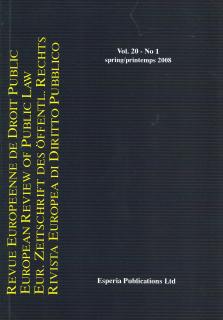
European Security: Albania
Migena Leskoviku
Dr., Professor of Law at the Law Faculty of the State University of Tirana, Albania
The idea of creating an Area of Freedom, Security and Justice in Europe becomes more and more an every-day reality in the European Union. The Council has adopted in recent years a number of important legal instruments; some of them are already implemented in the Member States and others are underway in national legislation. Defining and implementing a common foreign and security policy including the progressive framing of a common defence policy is a competence reserved for the Union. Title IV of the EC Treaty provides the EU Council with competences regarding issues on such matters like: visas, asylum, immigration and other policies related to the free movement of persons. The entry into force of the Amsterdam Treaty incorporated the Schengen rules into the institutional framework of the European Union. Judicial cooperation in criminal matters has become a matter of high priority for all Member States of the European Union and for the Council itself. The building of a common Area of Freedom, Security and Justice and the creation of the Schengen area have a prominent place in the process of consolidating and strengthening the Union and raising the profile of its institutions, not only internally in relation to the citizens of Europe, but also externally, in relation to the candidate countries, enabling them to acquaint themselves with the legal and institutional framework which constitutes the acquis in Justice and Home Affairs. Regarding the jurisdictional relations with foreign authorities, the Council Decision aims at facilitating and accelerating the extradition procedures among Member States and it substitutes all the political and administrative procedures with judicial procedures. The need to exchange information between law enforcement agencies has been among the more important issues dealt with lately. One of the innovations of the European Constitution is the aim to create a union of law. Thus, the jurisdiction of the Court of Justice is not limited to the first pillar, but it is extended to the third pillar, covering foreign policy, police and judicial cooperation in criminal matters. The Treaty on the European Union recognises that the Union respects fundamental rights as they are safeguarded by the European Convention and the common constitutional traditions of the Member States as “general principles of Community law”. The establishment of a European Union Agency for Fundamental Rights is a fundamental element of the EU policy to respect and promote fundamental rights, believing that in the future it will be a reference point for human rights in a transnational EU context. Fulfilment of European legislation requires the adaptation of the Member State’s structures and the mobilisation of national legal means. Thus, Albania is committed to build a consolidated democratic system, because it is convinced that the creation of a safe and stable environment, the consolidation of democratic institutions and the strengthening of the economy are inextricably tied to the integration processes to the EU. All the legal measures will serve to improve the domestic legislation to the law enforcement problems and to have it in line with the acquis communautaire.





















